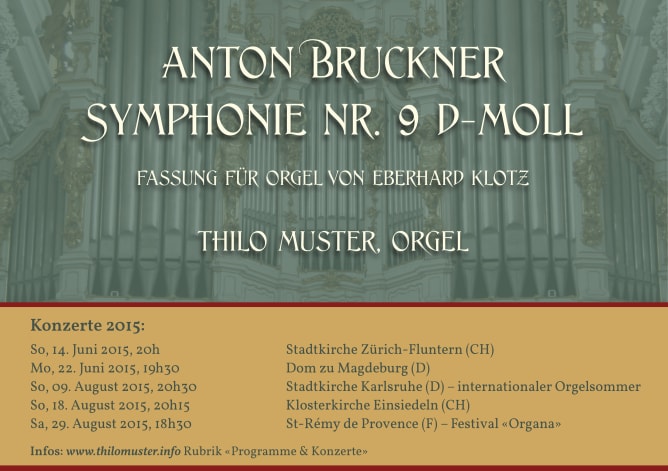A whole symphony — a single player!
One single person performing a symphony, usually played by 100 musicians? — On the organ this is possible! The transcription of Anton Bruckner’s ninth symphony by Eberhard Klotz for the King of Instruments, after a successful concert tour by the German-Swiss organist Thilo Muster, is now to be recorded on CD.
This symphony is one of the most significant and profound works of the late 19th century, in which Anton Bruckner, who came late to his career and to public recognition, left us his stunning musical legacy, which at the same time points far into the future. Although Bruckner worked on the composition for almost a decade — from 1887 until his death in 1896 — he was not able to complete it. There exist only extensive sketches of the large-scale final movement, that Bruckner with hope and resignation dedicated to »Almighty God«.
The fact that the three movements of the unfinished symphony offer a powerful unity is due not least to the tremendous third movement, the »Adagio«, which in its expressiveness as much as its compositional density and boldness balances perfectly with the monumental first movement and was considered by Bruckner himself to be the most beautiful thing he had ever written. Played on the organ, the symphony creates a uniquely wonderful and magnificent effect which cannot be compared with the orchestral version. This makes both the spiritual dimension and the modernity of this music stand out even more.
The recording will be made in Spring 2019 on the large symphonic Stahlhuth organ in the parish church of Saint Martin in Dudelange, Luxembourg by the new and innovative Belgian label organroxx.
Why on the organ?
But what, after all, is the purpose of organ transcriptions of large 19th century symphonic orchestral works at the present time? Firstly they can bring to life and artistically illuminate the rich and longstanding tradition of such transcriptions as an independent art form, an integral part of the Western music tradition. This is the way our recording project in Dudelange is to be understood, i.e. organ transcription as an independent art form and not as a substitute for the original orchestral work. Secondly, a transcription facilitates a fresh look at an already well-known work, and concertgoers have repeatedly confirmed that they have come to know another aspect of the »the Ninth«.
For example, in Chur/Switzerland the Bündner Tagblatt writes the following: »… [Muster’s] playing and his art of registration, together with the quality of the transcription, shed a new light on Bruckner’s composition, wresting from the original score the essence of the musical statement, thus making it possible to bring out the substance of the artistic will of the composer. In particular, the transcendence of the third movement of this Brucknerian »Ninth« revealed many new facets in such a transparent way such as hardly register in the tightly woven soundscape of a symphony orchestra.«
An impressive performance of Bruckner’s 7th Symphony in the Friedenskirche, Ludwigsburg/Germany which was attended by the author of this transcription at the age of 12, led from 1985 to an intensive compositional examination of Bruckner’s works. Furthermore, since he himself is also an organist, he began to arrange Bruckner’s symphonies for the organ, of which the transcription of the 9th symphony was the first. By 2024, Bruckner’s centenary year, all of Bruckner’s 9 symphonies will be published as organ transcriptions. Moreover, the 4th, 5th, 6th and 7th Symphonies are already available as organ transcriptions from the Merseburger publishing house in Kassel. In addition, there is also an analysis in book form of the Ninth Symphony in preparation.
We need your support!
For this 8-day recording project, we need not only conceptual support, but also funds for this extraordinary recording project that is unique in the organ world. The Ninth Symphony in a transcription for organ has not yet been recorded anywhere in the world. In addition to the costs of the recording itself, there are artist fees, travel and accommodation costs, assistants remuneration, organ tuning, as well as the production of the booklet and the CD. Support us, take advantage of our exclusive rewards and become part of an tremendous musical project!







